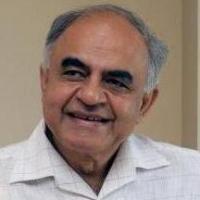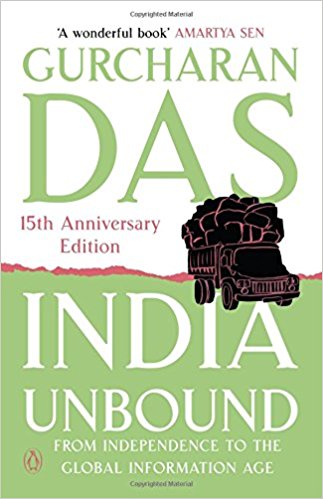India Unbound Summary
4 min read ⌚
 From Independence to the Global Information Age
From Independence to the Global Information Age
India is the world’s sixth largest economy by nominal GDP and the third largest by PPP. But, it wasn’t always so. In “India Unbound,” Gurcharan Das follows its rise from its independence to this day.
Or, better yet, from his own birth to his old age.
About Gurcharan Das
 Gurcharan Das is an Indian writer and public intellectual. A former “Times of India” columnist and CEO of Procter & Gamble (Indian subdivision), he graduated from Harvard and went on to write some of the most critically acclaimed books on India and its history.
Gurcharan Das is an Indian writer and public intellectual. A former “Times of India” columnist and CEO of Procter & Gamble (Indian subdivision), he graduated from Harvard and went on to write some of the most critically acclaimed books on India and its history.
He has also authored three plays and a novel.
“India Unbound Summary”
India is the second-most populous country in the world. It’s also one of the richest. And, yet, it’s been independent for just seven decades.
So, how did it get to here?
Well, it all started even before India’s independence with someone you undoubtedly know: Mahatma Gandhi. India was under British rule during the Second World War. So, Gandhi asked Winston Churchill for a guarantee that, if Indians fought on their side, India would gain its independence after the end of the war.
Churchill refused: “I did not become the Prime Minister of England,” he said, “in order to preside over the liquidation of the British Empire.”
So, Gandhi started the Quit India movement in 1942. Five years later, India got its independence.
And the speech which preceded it rings as loud in the ears of the Indians today as Martin Luther King’s words in the ears of the African-Americans.
It was delivered by Jawaharlal Nehru, India’s first Prime Minister, on August 14, 1947: “At the stroke of the midnight hour,” he announced, “while the world sleeps, India will awake to life and freedom. A moment comes, which comes but rarely in history when we step out from the old to the new when an age ends, and when the soul of a nation, long suppressed, finds utterance.”
Indians celebrate Nehru to this day, but Das think that he may have made one crucial economic mistake. Namely, implementing the Bombay Plan.
It is a plan with mythic status in India even today. It was based on socialist doctrines but strived for some sort of a China-like mixed economy. Even though fine on paper, Das thinks that it actually ended up making matters worse.
“The mixed economy,” he says, “actually combined the worst of socialism with the worst of capitalism: the controls of socialism with the monopolies and lobbies of capitalism.”
If nothing more, the Bombay plan made India a somewhat isolated country. During the Cold War, capitalism had its own agenda – and wasn’t really interested in helping socialist governments.
However, everything changed during the 1990s. Communism fell, and reforms made Indian markets freer and more open to the world. And, in Das’ opinion, this has started a revolution in Indian economy.
However, it’s still plagued by the caste system and by the fact that women are still marginalized.
Once that is over – India will rise even further up on the world’s economic ladder.
Becoming the powerhouse, it was always supposed to have been.
Key Lessons from “India Unbound”
1. India Got Its Independence in 1947
2. The Bombay Plan Isolated India’s Economy from the World
3. The Caste System Is the Only Thing Which Stands Between India and Greatness
India Got Its Independence in 1947
India is currently the sixth largest economy in the world (in terms of nominal GDP) and, yet, it has existed as an independent country for barely seven decades. It’s a marvel how it got this far in such a short time. Das, however, sees it as merely a beginning.
The Bombay Plan Isolated India’s Economy from the World
The problem, in his opinion, is that, instead of accepting capitalism, India embraced socialist economic doctrines. The Bombay Plan, written by eight of the leading Indian industrialists, has been criticized by both socialists for being too capitalistic, and by capitalists for being too socialistic.
Das is from the latter. However, he does think that India profited from the fact that it had democracy before it had capitalism.
The Caste System Is the Only Thing Which Stands Between India and Greatness
However, democracy is still barely in its infant stages. The problem: the loathed caste system which contributes to people living isolated lives. Movement up the hierarchical caste ladder is practically impossible. However, it’s necessary for capitalism and demy ocracy.
Once India overcome the caste system – it maeven become a world leader.
Like this summary? We’d Like to invite you to download our free 12 min app, for more amazing summaries and audiobooks.
“India Unbound” Quotes
This hundred-year backdrop does suggest that it is not unrealistic to be hopeful about the future. Click To Tweet The social life of Indians revolves around the family or caste. It does not encompass the whole community. Click To Tweet Because we have learned to live with pluralism, it is possible that we might be better prepared to negotiate the diversity of the global economy. Click To Tweet Poor teamwork is pervasive in India. Take any institution, scratch its surface and one finds factionalism. Click To Tweet India embraced democracy first and capitalism afterwards, and this has made all the difference. Click To Tweet
Emir is the Head of Marketing at 12min. In his spare time, he loves to meditate and play soccer.


 From Independence to the Global Information Age
From Independence to the Global Information Age



